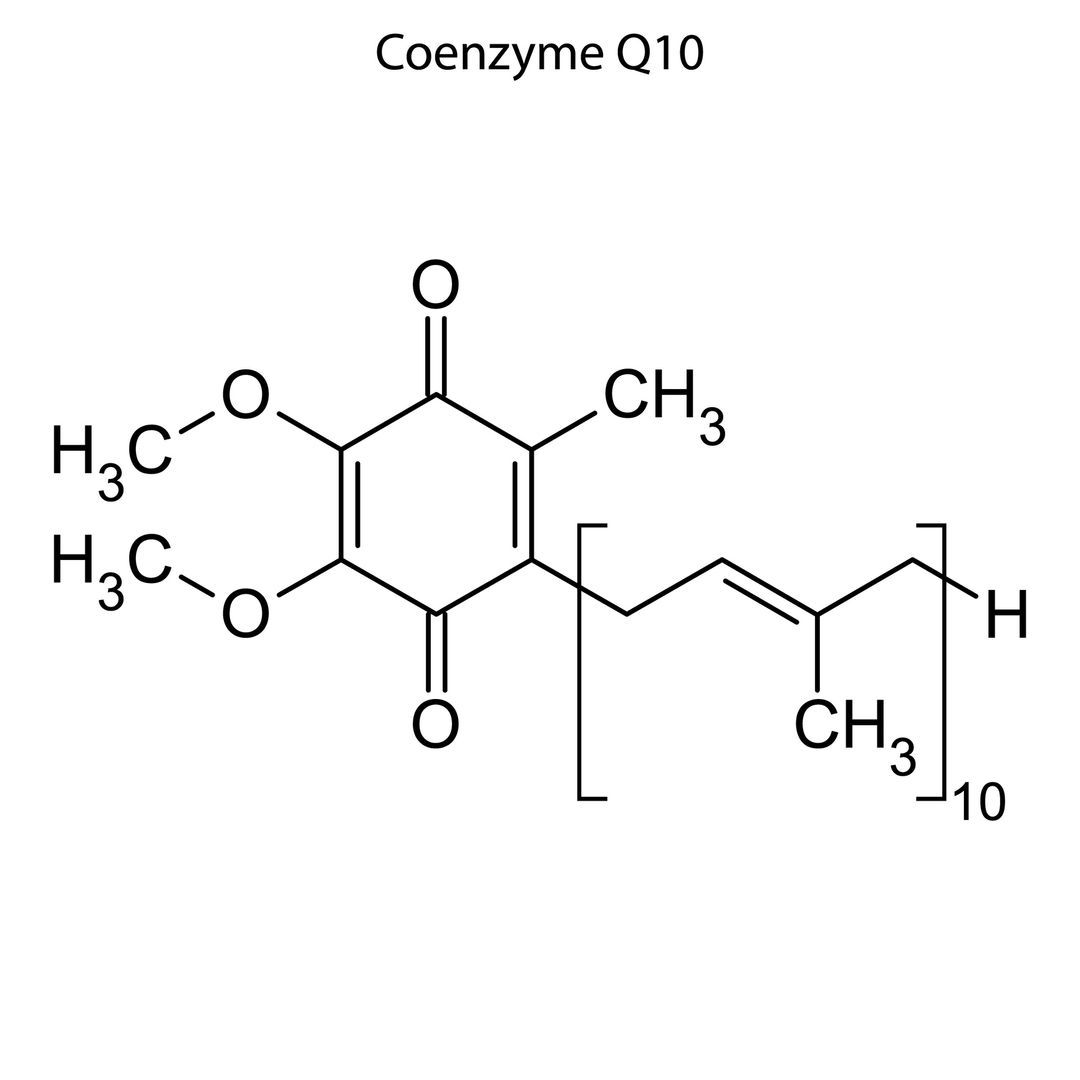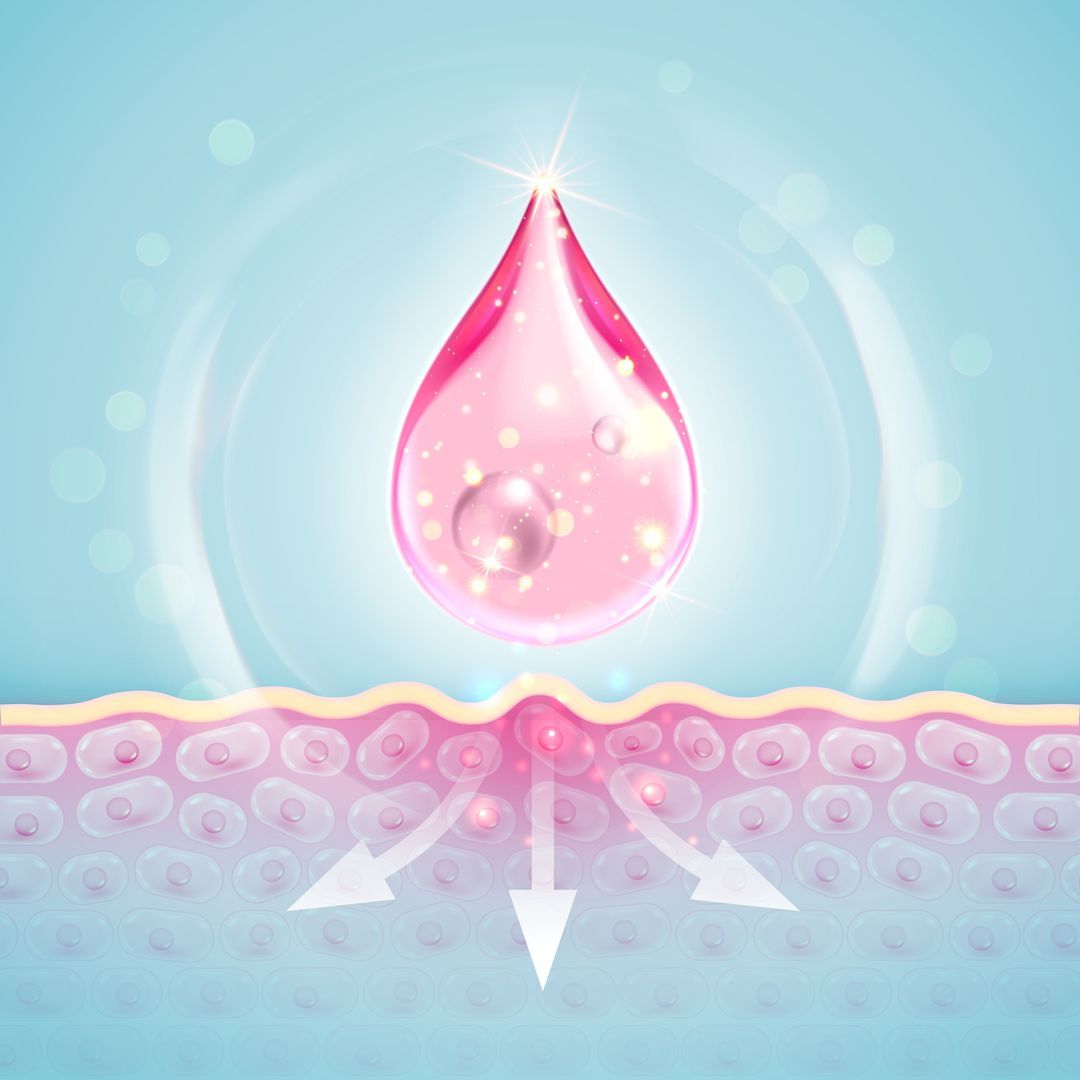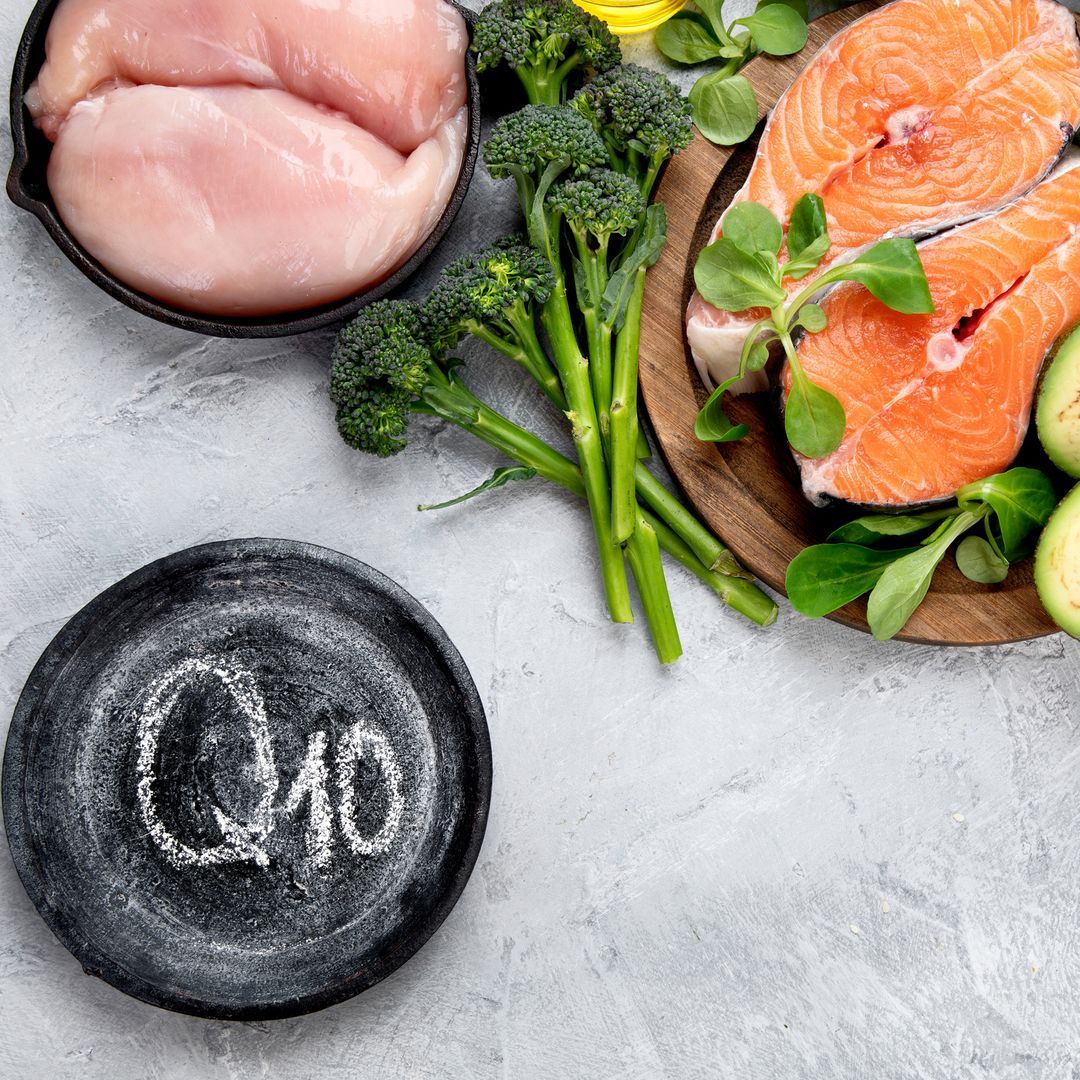CoQ10 (Coenzyme Q10) Skin Benefits: Explained
We are constantly seeking new methods to make our skin look firmer, healthier and generally younger. Numerous products on the market claim to boost cell turnover rate and improve the skin’s elasticity and firmness – and one such skincare ingredient is Coenzyme Q10. It is not a new ingredient, as the Japanese beauty industry has used it for years as part of their skincare routines.
Summary
Coenzyme Q10 (CoQ10) is a powerful antioxidant naturally found in our cells, crucial for energy production and protecting the skin from damage. This nutrient has become a popular ingredient in skincare for its ability to slow skin ageing, improve skin texture, and reduce wrinkles and sun damage. In this article, we explore everything you need to know about CoQ10, from its skin benefits and forms to dietary sources and practical tips on how to maximize its effects. Plus, learn how CoQ10 fits into a holistic approach to your health, including insights from a GlycanAge test that measures biological age for personalized health recommendations.
Introduction
The desire for youthful, glowing skin is universal. While topical creams promise miraculous results, the science of skin health points to antioxidants and mitochondrial support as the true heroes behind lasting skin vitality. Coenzyme Q10, or CoQ10, is one such nutrient, playing a pivotal role in cellular energy metabolism and antioxidant defense.
With age, the body’s natural production of CoQ10 decreases, which coincides with the visible signs of skin aging, including fine lines, wrinkles, and loss of firmness. Fortunately, modern skincare formulations and dietary supplements can help replenish CoQ10 levels, offering a scientifically-backed strategy to maintain a radiant complexion.
In fact, integrating CoQ10 into your daily health and beauty routine pairs well with other biohacking strategies and supplements recommended in resources like our comprehensive anti-ageing supplements guide or insights from wellness experts like Dr. Joel Kahn, whose focus on holistic heart and cellular health parallels the benefits of CoQ10.
What is CoQ10?

Coenzyme Q10 (otherwise known as CoQ10) is a naturally produced bodily enzyme and one of the most vital antioxidants. It helps protect cells from damage, provides energy products in cells, and plays an essential role in metabolism. However, as we age, the production of CoQ10 slows down, and supplies can diminish.
Humans produce CoQ10 at low levels when young, peak during late teens and then decline post 20 years of age. However, the 2019 CoQ10 and Ageing paper published by Isabella Peixoto de Barcelos and Richard H. Haas from the department of Neurosciences, University of California San Diego, stated that the drop in CoQ10 levels is not seen in all species or all tissues. In addition, they are unclear as to whether lower CoQ10 levels have a part to play in ageing and age-related disease or whether it is an inconsequential cellular response to ageing.
Vitamin C is another popular powerhouse ingredient, but CoQ10 has also been shown to use the same pathway to neutralise free radicals. CoQ10 is naturally occurring in all human body cells – including the skin and stratum corneum (outermost layer of the epidermis).
Antioxidants, such as those found on CoQ10, can be applied topically to the skin to help shield it from environmental elements that contribute to ageing skin – such as pollution, AV radiation and infrared radiation. Environmental sources cause the majority of the ageing of our skin, so in theory, if we block them, the skin will slow less.
The Anti-Ageing CoQ10 Skin Benefits

Although CoQ10 is naturally produced by our bodies and can be digested for energy, it is also understood to have a number of benefits in skincare products. CoQ10 is commonly added to toners, moisturizers, and under-eye creams, promising to help even skin tone and reduce the appearance of fine lines.
Reducing Sun Damage
UV exposure generates a cascade of free radicals that accelerate skin ageing, known as photoageing. CoQ10 counters this by neutralizing reactive oxygen species (ROS), preventing damage to skin cells and reducing the formation of pigmentation irregularities, sunspots, and dryness.
Studies published by the National Center for Biotechnology Information highlight CoQ10’s ability to protect keratinocytes and fibroblasts - the main skin cells responsible for maintaining skin integrity.
Replenish Skin Cells
CoQ10 energizes skin cells, promoting healthier skin. Researchers from Beiersdorf AG, Germany, found that topically applied CoQ10 can penetrate the skin and metabolize, providing antioxidant effects and supporting the maintenance of cellular energy levels. Energized cells are more effective at repairing and rejuvenating the skin, contributing to overall skin health.
Antioxidative Effects
Oxidative stress is a major driver of skin ageing, causing collagen breakdown and DNA damage. As a lipid-soluble antioxidant, CoQ10 stabilizes cell membranes and scavenges harmful radicals. This antioxidative effect also reduces inflammation and supports skin barrier function.
For those interested in maximizing antioxidant protection, CoQ10 is a key component alongside other antioxidants like Vitamin C and E, all covered in depth in our Vitamin K2 benefits guide.
Improved Skin Tone
CoQ10 has been shown to block the enzyme tyrosinase, which is responsible for melanin production. By inhibiting this enzyme, CoQ10 can help with depigmentation and even out skin tone. A 2019 study in Biochemical Pharmacology suggested that CoQ10 could act as a skin-whitening agent, making it beneficial in products aimed at brightening the complexion.
The Appearance of Fine Lines and Wrinkles
CoQ10 plays a role in stimulating the production of elastin and collagen, key proteins that keep the skin firm and smooth. This helps reduce the appearance of fine lines and wrinkles. A 2020 study from the Institute of Cosmetics in Slovenia found that CoQ10 supplementation positively impacted skin smoothness, wrinkle reduction, and dermis density.
This effect complements many biohacking approaches described in our complete guide to biohacking, which emphasize supporting skin structure for long-term health.
Enhanced Skin Hydration
CoQ10 also helps maintain optimal moisture levels in the skin, which is essential for keeping the skin soft, plump, and youthful. By supporting the skin’s natural barrier function, CoQ10 helps prevent water loss and improves hydration, making it especially beneficial for dry or dehydrated skin.
The Forms Available for CoQ10 Skincare

CoQ10 is available in a variety of forms in skincare products, offering flexibility in how it can be incorporated into a skincare routine.
Skincare Products
CoQ10 is commonly added to toners, serums, moisturizers, facial oils, and under-eye creams. The versatility of CoQ10 allows it to be safely mixed with other active ingredients such as vitamins E, C, B3, and B5, beta carotene, and essential oils like rosehip, chamomile, and green tea. These combinations enhance the overall benefits of CoQ10 in skincare products.
Daily Use in Skincare
CoQ10 can be seamlessly incorporated into a daily skincare routine. It can be applied before sunscreen or after sun exposure as part of an after-sun lotion. Since CoQ10 is fat-soluble, it works best when paired with other fat-soluble ingredients. However, mixing it with ingredients like retinol and glycolic acid might cause it to break down more quickly, reducing its potential benefits.
Body Care
While many focus on applying CoQ10 products to the face, it's also beneficial for the rest of the body. Applying CoQ10 cream after showers or baths, when the pores are most open, ensures that the skin can absorb its hydrating and anti-aging properties.
Ingestible Forms
CoQ10 can also be ingested as supplements or CoQ10 vitamins. A study from Slovenia found that subjects consuming CoQ10 had several anti-aging effects, including reduced wrinkles and improved skin smoothness and firmness. As CoQ10 is fat-soluble, it’s best to take supplements with food to improve absorption.
Food Sources of CoQ10
CoQ10 is naturally found in a variety of foods, providing an additional way to incorporate this antioxidant into your diet. Here are some of the most effective food sources of CoQ10:
Organ Meats
Organ meats, such as liver, kidney, and heart, are some of the richest sources of CoQ10. These meats provide a high concentration of the compound, making them an excellent choice for those looking to boost their CoQ10 intake. Liver, in particular, is noted for its ability to support energy levels and provide numerous other health benefits.
Muscle Meats
Muscle meats like pork, beef, and chicken also contain significant amounts of CoQ10. These are more commonly consumed compared to organ meats and offer a good way to increase CoQ10 intake in a diet, especially for those who prefer animal protein over organ meats.
Fatty Fish
Fatty fish, including sardines, herring, and trout, are among the best sources of CoQ10 in the marine food group. These fish provide not only CoQ10 but also omega-3 fatty acids, which are known for their anti-inflammatory properties. Including fatty fish in your diet is a heart-healthy way to get more CoQ10.
Nuts and Seeds
Nuts and seeds, such as peanuts, sesame seeds, and pistachios, are plant-based sources of CoQ10. These are especially beneficial for those on plant-based diets, as they provide CoQ10 without the need for animal products. Nuts and seeds also provide healthy fats that can further aid in the absorption of CoQ10.
Legumes
Legumes like lentils and soybeans are other plant-based sources of CoQ10. These foods offer the additional benefit of being rich in protein, making them a great option for those looking for plant-based sources of CoQ10 and other nutrients.
Oils
Soybean and canola oils provide small amounts of CoQ10 and essential fatty acids that protect skin barrier function.
Incorporating these foods into your diet alongside a personalized approach informed by tools like the GlycanAge test can optimize skin benefits.
Vegetables and Fruits
Vegetables like spinach and cauliflower, along with fruits such as oranges and strawberries, are also good sources of CoQ10. These plant-based options provide a wealth of antioxidants and vitamins in addition to CoQ10, promoting overall health and skin vitality.
Take Control Of Your Health With A GlycanAge Test
Understanding the benefits of CoQ10 can help you make informed decisions on how to incorporate it into your skincare routine, whether through supplements, topical products, or diet. Since our bodies cannot store CoQ10, it's essential to include it regularly for visible skin benefits and overall health.
While adding CoQ10 to your anti-aging regimen is a fantastic step, remember that maintaining a healthy lifestyle—through a balanced diet and regular exercise—is crucial for preserving both your physical and mental youthfulness. To truly take control of your health and monitor your aging process, consider biological age testing with a GlycanAge test. This test provides valuable insights into your biological age, helping you make informed decisions and adjustments for optimal aging.
Take action today! Discover your true biological age through GlycanAge testing and begin making the changes that will help you age gracefully.
Frequently Asked Questions (FAQs)
Is CoQ10 anti-ageing?
Coenzyme Q10 (CoQ10) is a naturally produced molecule that acts as an antioxidant agent. The level of CoQ10 in the body decreases as we age, and people use CoQ10 products and foods to help bring the levels back up. In addition, research has found that CoQ10 plays a significant role in protecting the skin, which can support anti-ageing.
How quickly does CoQ10 work?
Everyone's skin is different, and CoQ10 is only one of many anti-ageing tools we can include in our skincare routines. Most trials conducted into the effectiveness of CoQ10 for the skin have been over a period of at least 12 weeks. Remember that the body is unable to store CoQ10, so consistent use is needed to see the potential anti-ageing benefits.
When too take CoQ10: morning or night?
CoQ10 products are safe to use morning or night. However, some may be formulated for different times of the day. Therefore, it is best to check the guidance given by the manufacturer, which can often be found on the side of the products, on a supporting leaflet, or online. With regards to foods that are rich in CoQ10, these can be eaten at any time of the day.
Does CoQ10 have side effects?
The potential side effects will vary depending on the form of CoQ10 being taken. For example, topical CoQ10 products may cause some people to have skin itching and rashes. CoQ10 supplements may cause slight digestive problems like slight abdominal pain, nausea and vomiting. When side effects have been reported, they are usually mild, and most people find CoQ10 products safe to take when doing so as directed.
How much CoQ10 should I take for wrinkles?
Research into the correlation between CoQ10 dose-relationship and reduced wrinkles and fine lines is ongoing. Therefore, the recommended dose will be stated on the container when taking CoQ10 supplements or CoQ10 vitamins. Topical skin care products will also provide guidelines, but whatever form you use will need to be used consistently to see the potential anti-ageing results.
What vitamins should I not take with CoQ10?
CoQ10 is generally safe to use with most vitamins, but caution should be taken when combining it with high doses of vitamin K. Vitamin K plays a role in blood clotting and may interfere with CoQ10’s function in the body. If you’re on blood thinners or any medication affecting clotting, consult your healthcare provider before using CoQ10 alongside vitamin K.
What happens when you take CoQ10 every day?
Taking CoQ10 daily can help replenish its levels in the body, providing benefits for energy production, skin health, and overall vitality. Consistent daily use can help improve skin appearance, reduce the signs of aging, and support cellular health. However, results may take time, and regular use is crucial for the most noticeable improvements. Be sure to follow the recommended dosage and consult your healthcare provider if you have any concerns.


